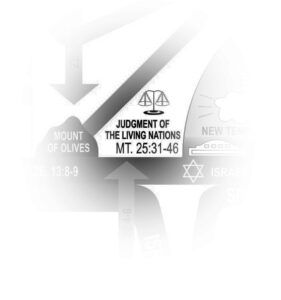 ‘After These Things’ Chapter 4.7 – The Judgment of the Nations
‘After These Things’ Chapter 4.7 – The Judgment of the Nations
From our book ‘After These Things – Summaries of John Nelson Darby’s Papers on Prophecy – and more…’ Compiled by Daniel Roberts. For more about this book click on the picture or CLICK HERE
A summary of the Seventh Lecture by J N Darby on the Present Hope of the Church – Geneva 1840 entitled The Judgment of the Nations, which become the Inheritance of Christ and of the Church
4.7 The Judgment of the Nations
 Evil will reach its height in the eighth head of the beast, the fourth (Rome) monarchy. It will go to destruction along with the false prophet who seduced the world to do homage to the beast and take his mark.
Evil will reach its height in the eighth head of the beast, the fourth (Rome) monarchy. It will go to destruction along with the false prophet who seduced the world to do homage to the beast and take his mark.
The scene is now extended. God will have judged the Antichristian beast and the evil nations, making His power felt: it is the moment of His wrath.
All that is high and lifted up will be brought low by the power and glory of God, so that God, in full blessing, may enjoy the kingdom, and may have the inheritance of all nations – ‘The kingdoms of this world are become the kingdoms of our Lord, and of his Christ; and he shall reign for ever and ever. (Revelation 11:15)
The Judge
At the birth of Christ, Herod showed his fury at the least thing that could challenge his royalty. He tried to get rid of Him by slaying the infants in Bethlehem. Thirty-three years later, the Lord Jesus, the Messiah, the true King over the whole earth, was presented to the Gentiles (in the person of Pontius Pilate), and to the Jews (in the person of the High Priest Caiaphas). Both rejected Him.
Now we have the Son anointed, King upon Zion, God’s holy hill. Zion is His throne; the (heathen) nations are His inheritance. ‘Ask of me, and I shall give thee the heathen for thine inheritance, and the uttermost parts of the earth for thy possession’ (Psalm 2:8).
Will the nations then, at last, listen to the invitation made to them to submit themselves? No! – So God can, and will, judge them.
His Judgment
Christ will be Judge, but this is not the last or general judgment (or the Great White Throne, or judgment of the dead). Everybody existing on the earth at the end of this time (seven years) will be either subject to Christ, and therefore saved and sent to life eternal, or in rebellion and condemned to eternal punishment. It is the judgment of the living nations on this earth: those who will people the earth during the Millennium. The dead will be raised for judgment after Christ’s millennial reign. ‘Before him shall be gathered all nations; and he shall separate them one from another, as a shepherd divideth his sheep from the goats.’ (Matthew 25:32). The judgment of the living (or ‘quick’ -as in KJV) is as certain as that of the dead.
How God deals with the nations is entirely different from the gospel: ‘Thou shalt break them with a sceptre of iron’ (Psalm 2:9 – Darby). In the gospel, the sceptre of Christ is a rod of goodness and love, sweet and powerful. The gospel is not a sceptre of iron.
‘The LORD is known by the judgment which he executeth: the wicked is snared in the work of his own hands’ (Psalm 9:16). This is not the language of the gospel; it is the righteous demand for justice. Christians who do not understand the difference between the dispensations often find these scriptures challenging. In the gospel, the grace of God is presented to the wicked, and God calls for repentance. Once the gospel has run its course, Christ will demand righteous judgment[1].
Christ invites the kings of the earth to submit themselves to Him. However, they follow their own ways; their policy settled according to the wisdom of man. Hence, if God were not to execute judgment, evil would only grow worse and worse without any consolation for the faithful. It is the time of judgment, and Christ is the Judge. ‘The Lord is King for ever and ever; the heathen are perished out of his land.’ (Psalm 10:15, 16) and Thou hast rebuked the heathen; thou hast destroyed the wicked; thou hast put out their name for ever and ever.’ (v.5). JND notes that the ‘wicked’ refers to the Antichrist.
God will assemble the nations, and pour upon them His indignation: ‘Therefore wait ye upon me, saith the Lord, until the day that I rise up to the prey; for my determination is to gather the nations, that I may assemble the kingdoms to pour upon them mine indignation’ (Zephaniah 3:8). The Lord will manifest Himself in this act of power in Israel[2].
The next verse (verse 9) tells us ‘For then will I turn to the people a pure language, that they may all call upon the name of the LORD’. This blessing, when the earth will be full of the knowledge of God, will come to pass only after He has executed judgment and put away the evildoers. This passage is a very explicit revelation. It is judgment, not grace.
The Lord’s Rule
Having accomplished this, Jesus sits down at the right hand of God the Father: ‘The LORD (Jehovah) said unto my Lord, Sit thou at my right hand, until I make thine enemies thy footstool.’ (Psalm 110:1). After that come the words, ‘Rule thou in the midst of thine enemies.’ (v.2) The Lord will now start to exercise His power on earth. This, of course, begins the Millennium.
[1] Christians are sheltered from the approaching storm. The church’s place is with Christ, accompanying Him. The church has the privilege and glory of union with the Lord Jesus Christ. It comprises a single body of both Jews and Gentiles. It was not revealed in the Old Testament. Hence, it is not in Zion that we are to look for the church because the church has the same portion as Christ, being His body: if we seek it, we will find Christ Himself.
The church’s place is not in the midst of the nations that are to be broken in pieces, but to be united to Christ, enjoying the same privileges as Christ. There is nothing true, as regards Christ, in the glory which He has taken as Man, which is not also true of the church. It is a precious thing for us to understand our place, that of joint-heirs with Christ. And the more we think of this, the more our strength will be increased, and the more our minds will be detached from this world, which is under judgment. The world comes under judgment because it has rejected Christ, The Saviour. ’Righteous Father, the world hath not known thee’ (John 17:25). Just as unbelief separates men entirely for all eternity from Christ, grace by faith has united us wholly and forever to Him; and we ought to bless God for it.
[2] We should note\:
It is at Jerusalem principally that all this disaster will take place; secondly, God has named in His word all the nations who will participate in it. We shall see all the descendants of Noah, of whom we have the catalogue in Genesis 10, reappear on the scene at the moment of this judgment of God
We shall find nearly all of them under the beast or under Gog (See Ezekiel 38) – essentially, they are the children of Japheth.
Darby drew on William Hale’s Analysis of Chronology, republished 2012 by Nabu Press, available from Amazon

